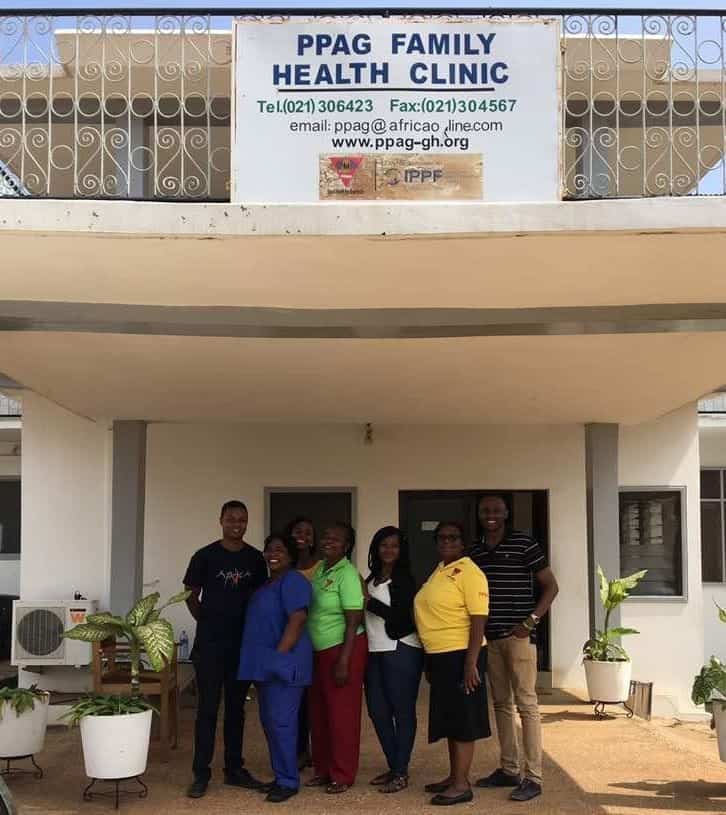 Sexual and reproductive health is a disputed topic in Africa due to cultural diversity and religion. Before embarking on this externship the three of us, Frank Kiwango, Sweetness Laizer, and Yasson Mwakibinga, fifth year medical students at Kilimanjaro Christian Medical University, had different ideologies and mentalities on what to say or not to say when discussing this topic. So far in our studies, we have had very few lectures on sexual and reproductive health including abortion care. Coming from Tanzania, our three weeks stay in Ghana taught us that the two countries share more cultural similarities than differences when talking about sexual and reproductive health, yet Ghana is a step ahead of most African countries in terms of access to safe abortion.
Sexual and reproductive health is a disputed topic in Africa due to cultural diversity and religion. Before embarking on this externship the three of us, Frank Kiwango, Sweetness Laizer, and Yasson Mwakibinga, fifth year medical students at Kilimanjaro Christian Medical University, had different ideologies and mentalities on what to say or not to say when discussing this topic. So far in our studies, we have had very few lectures on sexual and reproductive health including abortion care. Coming from Tanzania, our three weeks stay in Ghana taught us that the two countries share more cultural similarities than differences when talking about sexual and reproductive health, yet Ghana is a step ahead of most African countries in terms of access to safe abortion.
We completed our externship course, funded by Medical Students for Choice, at the Planned Parenthood Association of Ghana (PPAG). PPAG is a family planning clinic that offers a wide variety of services regarding sexual and reproductive health to all. The PPAG staff warmly welcomed us with full cooperation and hospitality throughout the externship. It was an exciting experience observing the clinical procedures conducted, including youth counselling, family planning, and comprehensive abortion care. Most clients came in worried about how they would be perceived or judged, but they were always received with a smile, and their health and safety was assured.
While spending time with the clients seeking comprehensive abortion care, we had a chance to hear different stories about why they needed these services at a safe place. It was a bit challenging when the clients spoke in their Ghanaian native language, either Twi or Ga, but thankfully the midwives were able to translate for us in between their conversations. Some stories were very sad and heartbreaking. A young girl who came in had been raped by her father and had no one to talk to. She could not report her family’s breadwinner to the police and none of her family members would believe her story.
There was a single, pregnant mother with a nine-month-old on her back, who broke down in tears because she couldn’t afford to care for the child on her back, let alone one more child. Some clients came in because their partners had denied to take care of the pregnancy, and some came in with cases of failed contraception. Some clients had already initiated abortion with unsafe methods such as inserting herbs through their cervix that led to scarring, or taking unknown drugs that were suggested by friends or partners. Despite the fact that such acts were dangerous to their own health, clients were still not readily open about their attempts of unsafe abortion before arriving at the clinic.
At the PPAG clinic, all cases are approached in a holistic manner, but we wondered: where can others who cannot access this clinic get comprehensive abortion care in Ghana? It is undeniable that these cases occur in most African societies and are seen as taboo. The silence around sexual reproductive health contributes to depression, unsafe abortion practices, and worst of all death.
Health policies in Tanzania, where we are from, and many other countries support post abortion care, but we must acknowledge the etiology of such cases. Many clients seeking post abortion care have attempted unsafe abortion techniques due to the lack of access to safe abortion. Laws that impede and criminalize abortion suppress reproductive health rights and oppress certain groups in society. On the other hand, the liberty of access to comprehensive abortion care services provided in Ghana has promoted sexual reproductive health and gender empowerment.
As future physicians, we acknowledge the role of physicians in reducing maternal mortality rate and improving reproductive health in our societies. We need comprehensive medical education on sexual and reproductive health in order to provide these health services to our future patients.
We strongly believe that education on sexual and reproductive health services and rights reduces rates of unintended pregnancy, unsafe abortion, and maternal mortality, particularly in communities within countries where access to safe abortion is still prohibited or limited. We must follow the example of this clinic, and build a generation with both knowledge of and access to reproductive health care services.